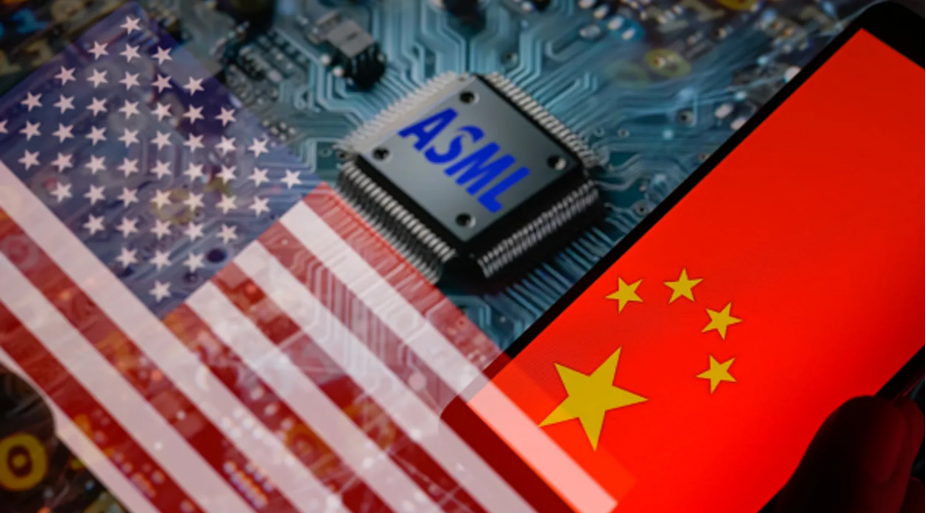As the global semiconductor industry continues to compete fiercely in the technology competition between China and the United States, the new sanctions that the United States is considering to impose on China's semiconductor industry have attracted widespread attention. Despite reports that the U.S. is considering increasing export restrictions on China's semiconductor equipment and AI-powered memory chips, the measure could be more lenient than previously proposed, sending shares of global semiconductor equipment companies up significantly.
Sanctions policy adjustment: global semiconductor equipment companies ushered in a positive situation
According to Bloomberg, the United States is considering further restrictions on the export of semiconductor equipment to China, especially artificial intelligence-related memory chips, but these new sanctions fall short of previous stricter proposals. Shares of the world's major semiconductor equipment suppliers performed strongly on Thursday on the news. For example, ASML rose about 2.9% in the European market, while Tokyo Electron's share price rose 6.7% in the Japanese market.
Analysts believe that with the adjustment of the U.S. sanctions policy, these semiconductor equipment companies may benefit from the relative easing of the policy. Especially for a key equipment maker like ASML, if the sanctions are not as stringent as expected, it could lead to a lower-than-expected decline in sales from the Chinese market.
The background of the semiconductor technology competition between China and the United States
Semiconductor technology competition between the United States and China, especially in the areas of chip manufacturing and advanced equipment, has been an important part of the technological and economic game between the two countries. In recent years, the U.S. government has sought to restrict China's access to advanced semiconductor technology and equipment through export controls and the Entity List. The core goal of these measures is to curb China's independent development in the semiconductor sector, especially when it comes to the import of high-end chip-making equipment.
ASML, a Dutch semiconductor equipment manufacturer, is at the heart of the U.S.-China technology competition. ASML's lithography machines are key to the manufacture of advanced semiconductor chips, which are relied upon by the vast majority of chipmakers worldwide to produce state-of-the-art process chips. Especially in chip manufacturing with 7nm, 5nm and smaller processes, ASML's extreme ultraviolet (EUV) lithography machine is almost irreplaceable.
However, based on the U.S.-Dutch government's cooperation, ASML has been facing export restrictions, especially when it comes to selling state-of-the-art equipment to China. Still, ASML can sell some of the less advanced lithography machines to China, but these machines produce chips with a lower level of technology than the most advanced EUV lithography machines.

Pictured: The U.S. is rumored to be considering easing restrictions on China?(image:CNBC)
Potential sanctions: manufacturing equipment companies, not production plants
According to a Bloomberg report, future sanctions may shift the focus from restricting exports to Chinese semiconductor production plants to restricting companies that manufacture semiconductor equipment in China. This strategic shift will help ASML and other similar semiconductor equipment manufacturers, especially those that sell equipment to global "fabs" (i.e., factories that actually produce chips).
If the U.S. government chooses to focus sanctions on restricting China's domestic semiconductor equipment manufacturers, companies like Changxin Storage () will likely be more affected. Changxin Storage, a Chinese memory maker that has the potential to challenge international giants such as SK hynix and Samsung, is not on the U.S. export blacklist, but still faces the risk of being further restricted.
ASML's outlook and challenges in the Chinese market
ASML has struggled in recent years to deal with the challenges posed by the US-China trade war. Especially in 2023, ASML expects revenue from the Chinese market to decline by 30%. However, ASML's expectations may change as U.S. policy adjusts. If the new sanctions do not reach the initial level of stringency, the potential negative impact on ASML's sales in the Chinese market will be reduced accordingly.
Despite various U.S. sanctions on China's semiconductor industry, ASML remains a key equipment supplier for high-end chip manufacturing around the world. The company will continue to play a significant role in the global market, especially in fabs such as Taiwan's TSMC and China's SMIC. For semiconductor equipment suppliers, how to stay ahead of the global competition, especially to find new growth opportunities in the changes in the Chinese market, will be a key challenge in the coming years.
Summary
The new round of sanctions that the U.S. government is considering for China's semiconductor industry has aroused widespread concern in the global semiconductor equipment market. Although the sanctions may have a certain impact on China's semiconductor industry, considering the relatively loose policies, the stock prices of global semiconductor equipment companies have risen, especially those of companies such as ASML and Tokyo Electron.






